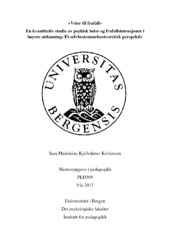Sara Madeleine Kristensen has conducted a cross-sectional study of first year Bachelor students in Biology and assessed their motivation, psychological health, and intentions of dropout. She presented her thesis entitled “Veier til frafall. En kvantitativ studie av psykisk helse og frafallsintensjoner i høyere utdanning: Et selvbestemmelsesteoretisk perspektiv” on June 22nd, 2017 and thus obtained her Master’s degree.
Abstract
 The lack of, or low, motivation and perceived competence have previously been shown to be paramount in students’ decision to drop out of their education. However, recent studies have shown that psychological issues, such as anxiety and depression, is the leading cause of dropout amongst high school students. This study aims to shed light on ill-being and the dropout phenomenon in higher education. 174 biology students from a university in Norway participated in this quantitative survey. A theorized model in accordance to Self-determination Theory, based on previous research and motivational models, was proposed. First, it was assumed that a controlling teaching style would predict a lack of motivation in the students and frustration of their basic psychological needs for autonomy, competence, and relatedness. Second, it was expected that need frustration would positively predict amotivation and ill-being, and negatively predict perceived competence. Finally, it was assumed that amotivation and psychological ill-being would have a positive prediction on dropout intentions, and that perceived competence would negatively predict the students’ intentions to drop out. Two path analyses were conducted to test the hypothesized model and an alternative model. It was further assumed that there was a significant correlation between the variables in the study. A bivariate correlation analysis was performed to investigate the relationship between the variables. Lastly, it was presumed that teacher control and need frustration had significant, indirect effects on dropout intentions. The results show that the hypotheses in the study are supported. The assumptions in the theorized model are supported by the results; teacher control, need frustration, amotivation, and perceived competence had a significant prediction on students’ ill-being and their dropout intentions. Further, there were significant correlations between the studies variables. Lastly, teacher control and need frustration had significant, indirect effects on dropout intentions through the full mediation of amotivation and perceived competence.
The lack of, or low, motivation and perceived competence have previously been shown to be paramount in students’ decision to drop out of their education. However, recent studies have shown that psychological issues, such as anxiety and depression, is the leading cause of dropout amongst high school students. This study aims to shed light on ill-being and the dropout phenomenon in higher education. 174 biology students from a university in Norway participated in this quantitative survey. A theorized model in accordance to Self-determination Theory, based on previous research and motivational models, was proposed. First, it was assumed that a controlling teaching style would predict a lack of motivation in the students and frustration of their basic psychological needs for autonomy, competence, and relatedness. Second, it was expected that need frustration would positively predict amotivation and ill-being, and negatively predict perceived competence. Finally, it was assumed that amotivation and psychological ill-being would have a positive prediction on dropout intentions, and that perceived competence would negatively predict the students’ intentions to drop out. Two path analyses were conducted to test the hypothesized model and an alternative model. It was further assumed that there was a significant correlation between the variables in the study. A bivariate correlation analysis was performed to investigate the relationship between the variables. Lastly, it was presumed that teacher control and need frustration had significant, indirect effects on dropout intentions. The results show that the hypotheses in the study are supported. The assumptions in the theorized model are supported by the results; teacher control, need frustration, amotivation, and perceived competence had a significant prediction on students’ ill-being and their dropout intentions. Further, there were significant correlations between the studies variables. Lastly, teacher control and need frustration had significant, indirect effects on dropout intentions through the full mediation of amotivation and perceived competence.
Link to BORA and to the thesis
About the author

